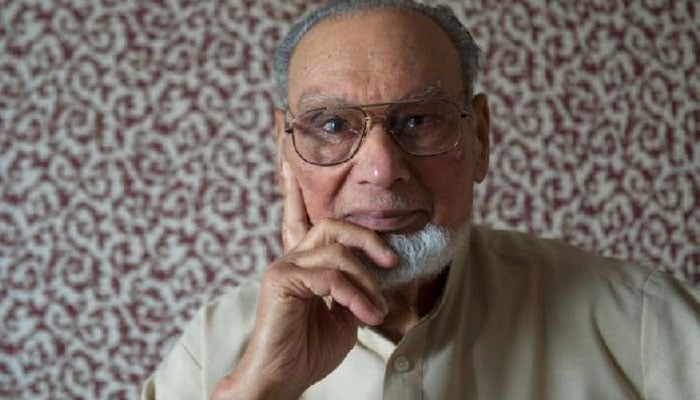Bashir Maan, first Muslim elected as councillor in UK, passes away
LONDON: Rich tributes were paid to veteran British-Pakistani politician Bashir Maan who passed away in Glasgow on Friday morning aged 93. Born in 1926 in Qila Didar Singh, a town near Gujranwala city in Pakistan, he was elected as a councillor from Glasgow way back in 1970. Bashir was the first Muslim politician to be elected to an office.
Bashir completed his school education in Qila Didar Singh before moving to Labour where he worked as a clerk. He was also part of the Pakistan’s independence struggle from 1943-1947. After the patrician in 1947 he moved to the UK in 1953 and lived in Scottish city of Glasgow all his life.
Before becoming a councillor he also served as a Justice of Peace for Glasgow, the first Asian & Muslim to be appointed in that position. Subsequently he was elected as councillor from Glasgow city in 1970 on Labour Party’s ticket.
A party he represented for the next 33 years till he left Labour in 2004 over parties misleading Iraq War policies. Such was the significance of his victory that then Indian High Commissioner wrote a letter to congratulate him on this achievement and marked the occasion proud and happy as he was the first immigrant to be elected as councillor in Scotland.
Bashir Maan was also the first British-Pakistani to stand in a general elections in 1974 from East Fife. He was a life-long advocate of Human Rights and community cohesion, in the recognition of his services towards race relations, community work and as a volunteer he was awarded CBE.
-
 2026 Winter Olympics Men Figure Skating: Malinin Eyes Quadruple Axel, After Banned Backflip
2026 Winter Olympics Men Figure Skating: Malinin Eyes Quadruple Axel, After Banned Backflip -
 Meghan Markle Rallies Behind Brooklyn Beckham Amid Explosive Family Drama
Meghan Markle Rallies Behind Brooklyn Beckham Amid Explosive Family Drama -
 Scientists Find Strange Solar System That Breaks Planet Formation Rules
Scientists Find Strange Solar System That Breaks Planet Formation Rules -
 Backstreet Boys Voice Desire To Headline 2027's Super Bowl Halftime Show
Backstreet Boys Voice Desire To Headline 2027's Super Bowl Halftime Show -
 OpenAI Accuses China’s DeepSeek Of Replicating US Models To Train Its AI
OpenAI Accuses China’s DeepSeek Of Replicating US Models To Train Its AI -
 Woman Calls Press ‘vultures’ Outside Nancy Guthrie’s Home After Tense Standoff
Woman Calls Press ‘vultures’ Outside Nancy Guthrie’s Home After Tense Standoff -
 Allison Holker Gets Engaged To Adam Edmunds After Two Years Of Dating
Allison Holker Gets Engaged To Adam Edmunds After Two Years Of Dating -
 Prince William Prioritises Monarchy’s Future Over Family Ties In Andrew Crisis
Prince William Prioritises Monarchy’s Future Over Family Ties In Andrew Crisis -
 Timothée Chalamet Turns Head On The 'show With Good Lighting'
Timothée Chalamet Turns Head On The 'show With Good Lighting' -
 Bucks Vs Thunder: Nikola Topic Makes NBA Debut As Milwaukee Wins Big
Bucks Vs Thunder: Nikola Topic Makes NBA Debut As Milwaukee Wins Big -
 King Charles Breaks 'never Complain, Never Explain' Rule Over Andrew's £12 Million Problem
King Charles Breaks 'never Complain, Never Explain' Rule Over Andrew's £12 Million Problem -
 Casey Wasserman To Remain LA Olympics Chair Despite Ghislaine Maxwell Ties
Casey Wasserman To Remain LA Olympics Chair Despite Ghislaine Maxwell Ties -
 Shaun White Is Back At The Olympics But Not Competing: Here’s Why
Shaun White Is Back At The Olympics But Not Competing: Here’s Why -
 Breezy Johnson Engaged At Olympics After Emotional Finish Line Proposal
Breezy Johnson Engaged At Olympics After Emotional Finish Line Proposal -
 King Charles Wants Andrew To 'draw A Line' Under Epstein Issue
King Charles Wants Andrew To 'draw A Line' Under Epstein Issue -
 John Wick Game Confirmed With Keanu Reeves And Lionsgate Collaboration
John Wick Game Confirmed With Keanu Reeves And Lionsgate Collaboration




